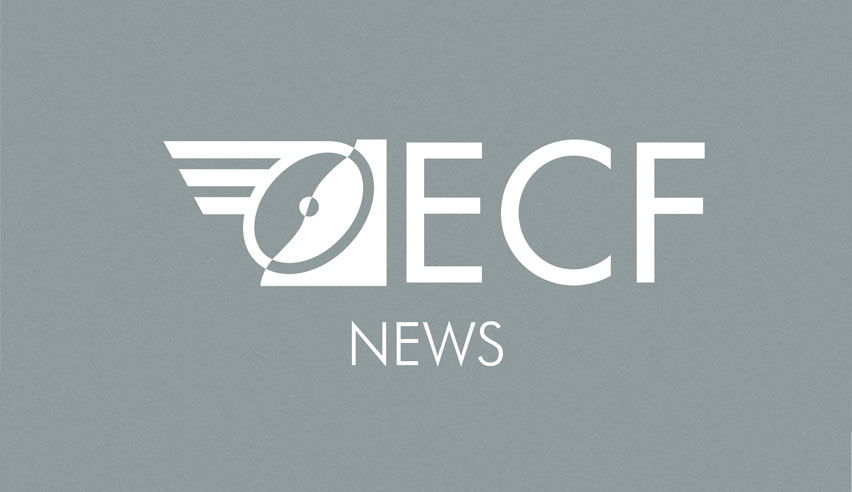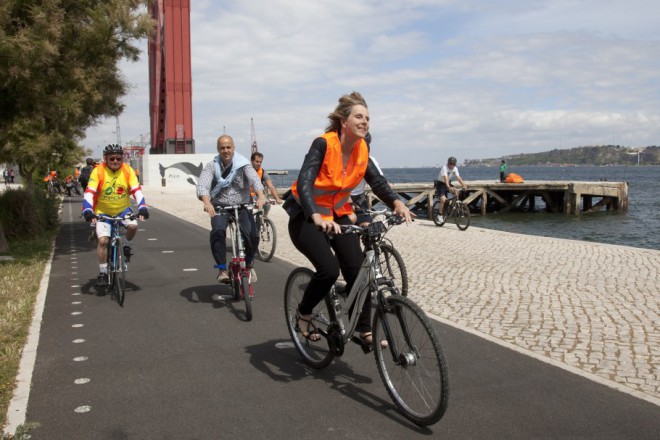
EU Budget 2014 - 2020 Explained: What Cycling Can Expect and Why You Should Act Now
 Get Europe cycling: Connie Hedegaard, EU Commissioner for Climate Action, on a bike.
Get Europe cycling: Connie Hedegaard, EU Commissioner for Climate Action, on a bike. Photo (c) European Commission
Last week the European Parliament voted in favour of the EU's Multiannual Financial Framework (MFF) - the EU budget, in fact - for the years 2014 to 2020. The Council of the EU is expected to do the same in a few weeks, which will end long and hard negotiations. This is our overview of what cycling can get out of the budget.
The MFF 2014-2020 sets the ceiling for EU spending during this seven-year period. It defines spending priorities that are geared towards sustainable growth, jobs and competitiveness in line with the EU's growth strategy Europe 2020. The total amount of the new EU budget is 960 billion € - an impressive number, about 1% of the EU’s total GDP.
The MFF is divided into six categories of expenditure ('headings') corresponding to different areas of EU activities. Each of them encompasses a range of programmes and funds. These funds are there to provide financial support to beneficiaries such as farmers, students, scientists, NGOs, businesses, towns, regions and, hopefully, cycling projects, infrastructure and advocacy organizations.
We had a look at each of these programmes and funds to dig out potential resources for cycling for the years to come.
Heading 1.A - Competitiveness for growth and Jobs
-
Connecting Europe Facility: This new facilty will contribute to fund the Trans-European Networks - Transport (TEN-T) programme, as well as telecommunication and energy networks. TEN-T covers those transport links considered to be strategically important to Europe and it has its own funding stream of 26 billion Euros from 2014-2020 (together with the energy network). Recently, EuroVelo has been mentioned in TEN-T legislation for the first time and hopefully, a piece of the TEN-T cake will be available for long-distance cycling routes.
-
COSME is a new EU programme that aims to support small and medium enterprises. Start-ups in the bike industry could rely on extra support from the programme, but the bike industry as a whole also has stakes in the programme. After all, many bike companies and bike retailers are SME’s. Cycling tourism and related SMEs might also benefit.
-
Horizon 2020 is the EU’s research support fund. And cycling needs research, in a variety of fields - that’s why there is the ECF’s Scientists for Cycling network. Applied sciences (what future for e-bikes?), innovative road infrastructure (cycling superhighways, for example), or cycling as part of sustainable development - just to mention a few.
Update 29/11/2013: As part of Horizon 2020, the European Innovation Partnership on Smart Cities and Communities (EIP-SCC) aims to bring together cities, industry and citizens to improve urban life through more sustainable and integrated solutions.
The initiative finances light-house projects that include three components: higher energy efficiency, better transport solutions and intelligent use of Information and Communication Technologies (ICT). Why not build, for example, the next 4th generation-type bike-sharing scheme for your city with funds from this programme? The previous call, from 2012, had a total budget of € 375 million. -
Erasmus+ is the new and extended version of the EU’s legendary Erasmus programme. In addition to financing research and transnational mobility of young workers and students (and international interns in cycling NGOs...), part of the Erasmus+ resources will now also be spent on sport and physical activity. With the Now We Move campaign, ECF is already in the game.
-
The Social Change and Innovation funding programme is designed to support employment and social policies across the EU. Cycling as an inclusive form of mobility and an industry that’s estimated to be worth €200 billion to the EU economy is an ideal candidate for funding here as well.
Heading 1.B - Economic, Social and Territorial Cohesion
-
The Cohesion fund is supposed to reduce economic and social shortfall between regions in the EU. It also helps stabilize the economy of Member States whose Gross National Income (GNI) per inhabitant is less than 90 % of the EU average. We hope that the decision to mention EuroVelo in the TEN-T legislation will help open this funding stream to cycling projects.
-
The European Regional Development Fund (ERDF) and the European Social Fund both aim to improve the economic and social situation in regions as well, but are differentiated according to the regions’ level of development.
-
The most developed regions (whose GDP is above 90 % of the EU average) can get support for projects focusing on competitiveness.
-
Less developed regions (whose GDP is less than 75 % of the EU average) will get help to get closer to the forerunners.
-
Transition regions (whose GDP is between 75 % and 90 % of the EU average) can finance special measures join the club of the most developed regions.
-
-
The ERDF also provides support for territorial cooperation programmes, which help regions across Europe work together. Cycling infrastructure could be financed from such cross-border programmes. They are also ideal to support planning and awareness-raising (for example about EuroVelo routes). The ERDF also provides special support to the outermost and least populated regions.
-
The Youth employment initiative focuses on integrating young people into the labour market providing training and education – another chance for the bike industry and cycling tourism companies…
-
To learn more about the EU regional policy, start here. To read how it takes shape, see here.
Heading 2 - Sustainable Growth: Natural Resources
-
Life+ is the EU’s funding instrument for the environment. Most EU funds for NGOs working on climate change and ecology come from this programme: an opportunity that’s not to be missed for cycling advocates.
-
The European Agricultural Fund for Rural Development can help develop cycling tourism in rural areas and improve accessibility of rural areas by bike. National governments could prepare cycling-related projects with funds from this programme – but they will need to be convinced to do so.
Heading 3 – Security and Citizenship
-
Health for Growth: this programme aims to support and add value to the health policies of the member states. Besides the abundant evidence of how cycling positively affects physical and mental health and fitness, it’s estimated to be worth €121 billion to the EU in health savings alone. Time to let the politicians know.
-
The Europe for Citizens programme is supporting activities to increase awareness and citizens' understanding of the EU, its values and history, including partnerships between cities (town-twinning). The programme aims to help people become more engaged in civic and democratic activities through debates and discussions on EU-related issues. Maybe a place for cross-border cycling tours or exchanges among cycling advocates?
Heading 4 - Global Europe
-
European Neighbourhood Instrument: the ENI promotes enhanced political cooperation and progressive economic integration between the Union and its neighbouring countries. ECF members from Turkey or Ukraine, for instance, might want to take a closer look at this funding stream.
What’s next?
Most funds are not being spent directly and exclusively by the EU, but together with the member states or regions. Therefore, member states and regions will soon prepare so-called Partnership Agreements as well as national and regional Operational Programmes for different sectors laying out their funding priorities.
Now is the time when national and regional authorities should be asked to think about cycling before sending their Operational Programmes back to Brussels. But you should know what exactly you are asking for.
To learn more, please visit the ECF’s page on European Funding.
About the authors
 Alessio Punzi is Communications Assistant at the European Cyclists’ Federation. He holds a Master’s Degree in Sports Management and has previously worked in Rome for a sports events firm.
Alessio Punzi is Communications Assistant at the European Cyclists’ Federation. He holds a Master’s Degree in Sports Management and has previously worked in Rome for a sports events firm.
Karsten Marhold works as Communications Assistant at the European Cyclists’ Federation. He has a masters degree in European history and cultures and is a researcher in European Integration in Brussels. His interests focus on cycling as a sustainable form of mobility and the corresponding EU policies.
- Log in to post comments
Contact the author
Recent news!
Upcoming events
Contact Us
Avenue des Arts, 7-8
Postal address: Rue de la Charité, 22
1210 Brussels, Belgium










